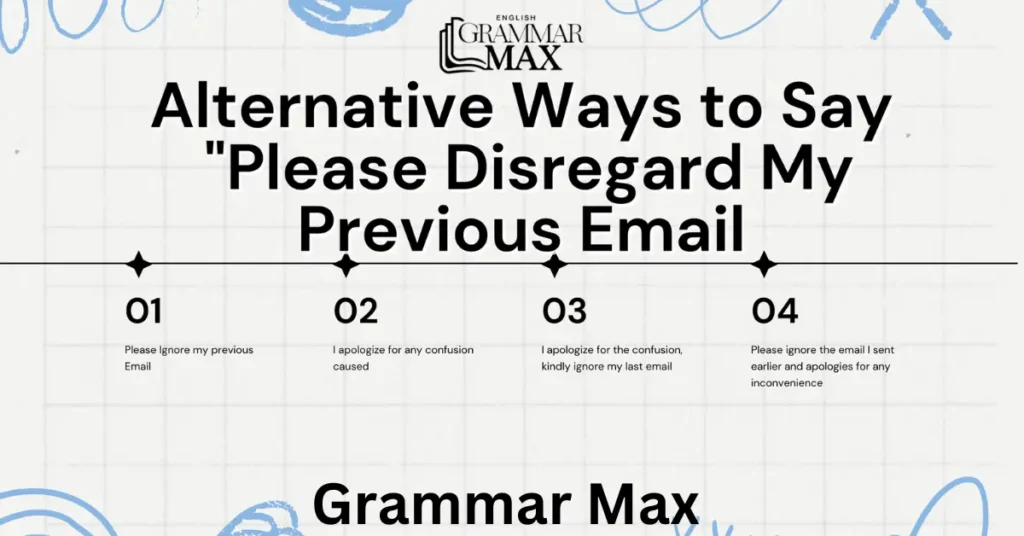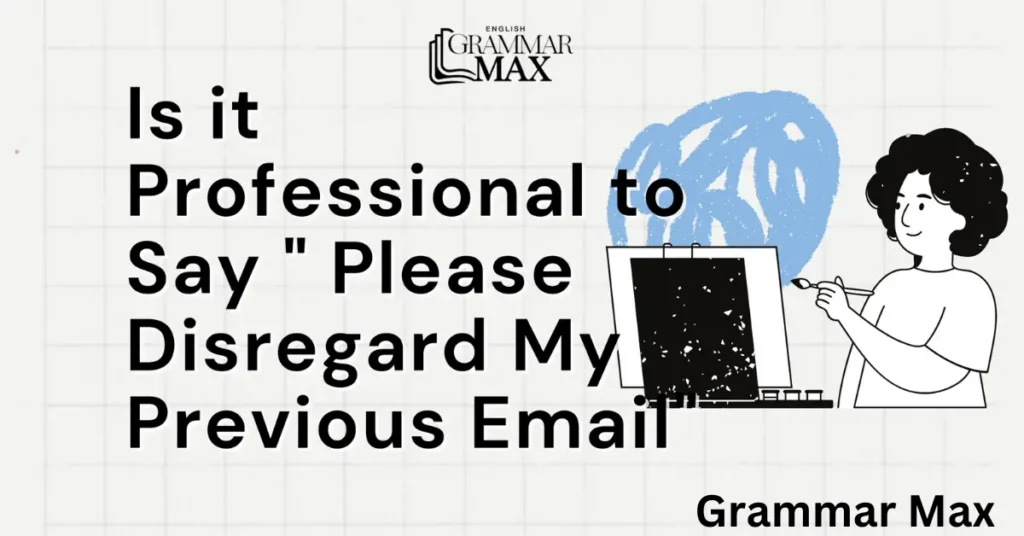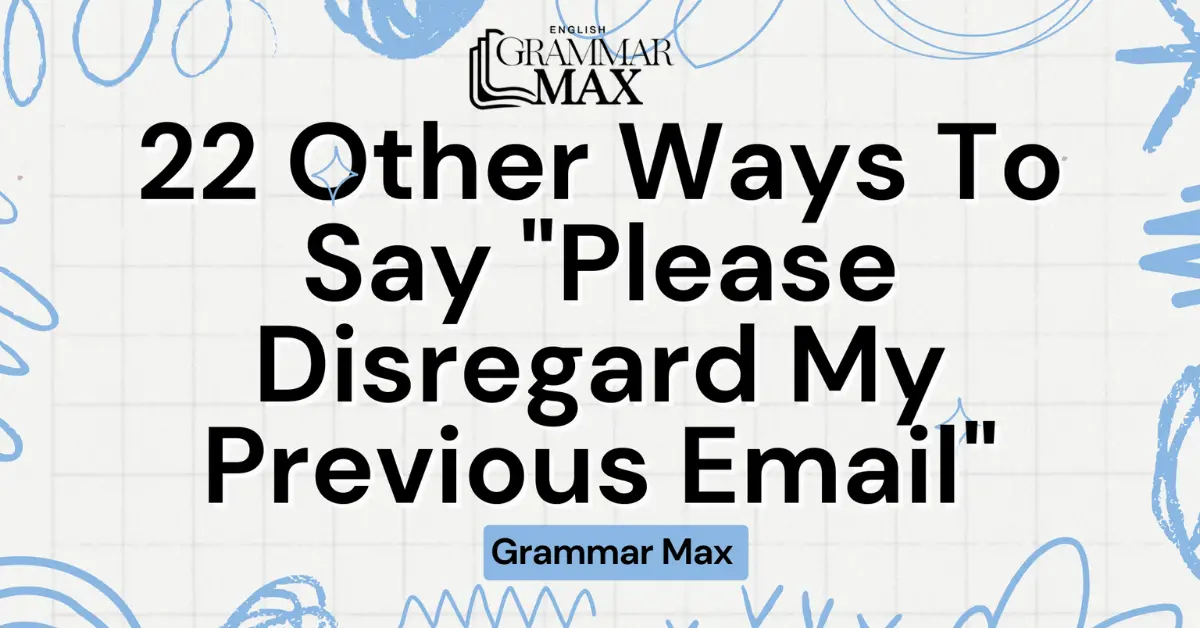Mistakes happen, and in the fast-paced world of email communication, sending a premature or incorrect email is a common blunder. When you realize the error, it’s essential to correct it professionally and politely. There are many alternative phrases you can use to request the recipient to ignore or disregard your previous email. Below, we’ll explore 22 alternative ways to say, “Please disregard my previous email,” with definitions, best use scenarios, and sample email examples.
Alternative Ways To Say “Please Disregard My Previous Email”

You can use these ways instead to say ‘Please Disregard My Previous Email”:
- Please ignore my previous email
- Please disregard my previous email
- Kindly disregard my previous email
- Disregard my previous message
- I apologize for any confusion caused
- Please disregard the email I sent earlier
- Disregard my previous communication
- I’d like to retract my previous email
- Please disregard the last email I sent
- Let’s disregard my previous message
- I retract my earlier email
- Please disregard the message I sent previously
- Kindly disregard my earlier message
- Ignore the earlier email
- Apologies for the mistake, please disregard the previous email
- Please disregard the previous email and refer to this one
- I apologize for the confusion, kindly ignore my last email
- Please ignore the email I sent earlier and apologies for any inconvenience
- Please overlook my previous message
- I apologize for the error, please ignore my earlier email
- Please disregard the communication sent moments ago
- My apologies, please dismiss the earlier message
Please Ignore my previous email
Please ignore my previous email is a polite and direct way to request that the recipient disregard a prior message. It implies that the content of the previous email was incorrect or irrelevant, and the sender acknowledges this mistake.
This phrase is commonly used in both formal and informal communications. It’s useful when you need to quickly correct an error, ensuring that the recipient focuses on the updated information rather than the initial email.
Please disregard my previous email
Please disregard my previous email is a formal and courteous way to ask the recipient to overlook the content of a prior message. It suggests that the previous email was sent with incorrect or outdated information, and the sender wishes to clarify or correct the mistake.
This phrase is commonly used in professional settings where clarity and precision are essential. It is suitable when you need to correct significant errors in communication, ensuring the recipient focuses on the corrected email.
Best Use:
Use this phrase when communicating with colleagues, clients, or management in formal business correspondence where the earlier email contains important inaccuracies that need correction.
Kindly disregard my previous email
Kindly disregard my previous email is a polite and formal way of requesting the recipient to ignore an earlier message. The use of “kindly” adds a touch of courtesy, making the request sound more respectful.
This phrase is often used in professional environments when an earlier email contains incorrect information or was sent in error. It conveys both professionalism and a sense of urgency in correcting the mistake, ensuring the recipient focuses on the updated communication.
I apologize for any confusion caused
I apologize for any confusion caused. It is a polite way to acknowledge that your previous message may have led to misunderstanding or confusion. It shows accountability while seeking to clarify the situation.
Best Use:
This phrase is ideal when you need to correct a mistake or provide further clarification after an error in communication has caused confusion for the recipient.
Example:
Subject: Clarification on Project Deadline
Dear Emily,
I apologize for any confusion caused by my earlier email. The correct project deadline is November 12th, not November 10th as previously stated. Please let me know if you need any further clarification.
Best regards,
James
I’d like to retract my previous email
I’d like to retract my previous email as a formal request indicating that the sender wishes to withdraw or cancel the contents of an earlier message. This phrase is often used when the initial email contains errors or information that is no longer valid.
Using this phrase signals a sense of professionalism and responsibility, as it acknowledges the mistake while striving to maintain clear communication. It reassures the recipient that the sender is committed to providing accurate and relevant information moving forward.
Ignore the earlier email
Ignore the earlier email is a direct and informal way to request that the recipient not consider the content of a previous message. This phrase is often used to clarify that the information in the earlier email is no longer relevant or accurate.
Best Use:
This phrase is suitable for casual or internal communications among colleagues where a quick correction is needed without formalities.
Scenario Example:
Subject: Update on Team Outing
Hi Team,
Ignore the earlier email I sent about the team outing. The date has been changed to Saturday, October 21st, instead of the previously mentioned date.
Thanks,
Jessica
I apologize for the confusion, kindly ignore my last email
I apologize for the confusion, kindly ignore my last email is a courteous way to acknowledge that the previous email may have led to misunderstandings. This phrase expresses both an apology and a request for the recipient to disregard the content of the last message, emphasizing a desire to clarify the situation.
Using this phrase conveys accountability and respect for the recipient’s time and understanding. It is especially effective in maintaining a professional tone while addressing any potential errors in communication.
Best Use:
This phrase is ideal for formal correspondence where an earlier message contained incorrect or misleading information, and you wish to ensure that the recipient is aware of the error while remaining courteous.
Please overlook my previous message
Please overlook my previous message is a polite request asking the recipient to disregard the content of a prior communication. This phrase is typically used when the earlier message contained inaccuracies or was sent in error.
Best Use:
This phrase is suitable for both formal and informal situations when you need to correct a mistake without sounding overly apologetic. It maintains professionalism while providing clarity.
Scenario Example:
Subject: Correction on Schedule Change
Hi Mark,
Please overlook my previous message regarding the schedule change. The meeting is still set for Thursday at 2 PM, and I appreciate your understanding.
Best,
Sarah
I apologize for the error, please ignore my earlier email
I apologize for the error, please ignore my earlier email is a courteous way to acknowledge that the previous email contained a mistake and request that the recipient not consider its contents. This phrase demonstrates accountability and a commitment to clear communication.
Using this expression conveys both professionalism and respect for the recipient’s time, as it emphasizes the sender’s intention to provide accurate information. It effectively mitigates any confusion that may have arisen from the erroneous message.
Is it Professional to Say “Please Disregard My Previous Email”?

Yes, it is professional to say, “Please disregard my previous email,” especially when addressing mistakes or outdated information. This phrase shows accountability and a commitment to clear communication, which is essential in a professional environment. By politely requesting the recipient to ignore an earlier message, you help maintain clarity and prevent potential misunderstandings. Additionally, using this phrase reflects a respectful attitude towards the recipient’s time and attention, reinforcing your professionalism and dedication to accurate information in the workplace.
Conclusion
Mistakes in email communication are common, but addressing them with politeness and clarity is essential for maintaining professionalism. Using alternative phrases to request that recipients disregard previous emails shows accountability and a commitment to accuracy, helping to prevent misunderstandings.
By understanding how to communicate corrections effectively, you can navigate potential pitfalls in your correspondence. Whether you choose a formal or informal phrase, maintaining a respectful tone is key to valuing the recipient’s time and attention. With these 22 alternatives, you can ensure that your messages remain clear and effective, fostering a more positive work environment.

William Henry is a writer for Grammar Max, a blog that focuses on synonyms and phrases. He loves exploring the quirks of the English language and enjoys helping readers improve their vocabulary. William’s articles are easy to read, fun, and full of useful tips for anyone looking to better understand and use English. Whether you’re a student, a professional, or just someone interested in language, William’s writing on Grammar Max makes learning about words and their meanings simple and enjoyable.
